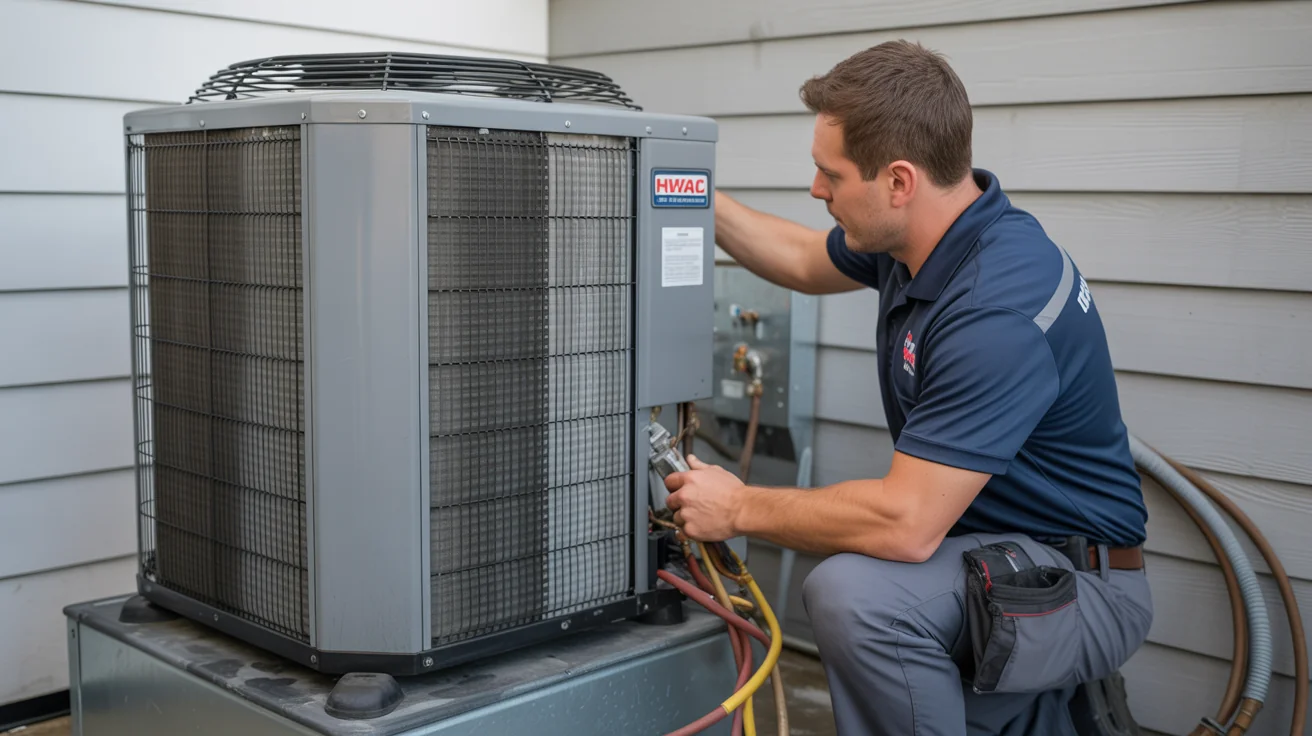Gas Smell From Furnace What To Do First
Smell gas from your furnace? Follow these critical safety steps immediately. Get emergency numbers for North Texas gas utilities plus HVAC response.

If you smell gas near your furnace, evacuate immediately without turning on lights or using electronics, then call Atmos Energy at 866-322-8667 from outside. Gas leaks require professional utility response before any HVAC work can begin safely. Natural gas has a distinctive rotten egg smell (mercaptan) added specifically for detection. After the gas company clears your home, call (940) 390-5676 for furnace inspection and repair. Never attempt to locate or fix gas leaks yourself.
Follow These Emergency Gas Leak Steps
Listen to me carefully. I’ve been to too many gas leak calls, and I’ve seen what happens when people don’t take this seriously.
If you smell gas, this is what you do RIGHT NOW:
-
GET EVERYONE OUT OF THE HOUSE. Don’t debate it. Don’t finish what you’re doing. Just leave.
-
Call your gas company FIRST - they have the equipment and training to handle gas leaks safely:
- Atmos Energy: 866-322-8667
- Texas Gas Service: 800-959-5325
-
Call 911 if the smell is strong or you feel dizzy or sick
-
Call me at (940) 390-5676 ONLY after the gas company clears the area as safe
Don’t turn lights on or off. Don’t use your phone inside. Don’t start your car if it’s in an attached garage. Just get out and call for help.
North Texas Gas Utility Emergency Numbers:
Contact Atmos Energy at 866-322-8667 for natural gas emergencies throughout most of North Texas. Reach Oncor Electric at 888-313-4747 for electrical emergencies that may be related to gas appliances. Call Texas Gas Service at 800-959-5325 in areas where they provide natural gas service. Contact CenterPoint Energy at 713-659-2111 for gas emergencies in southern areas of the metroplex.
What to Tell the Dispatcher:
When you call the gas company or 911, stay calm and give them this information:
Provide your complete address and the closest major intersection to help emergency responders locate you quickly. Describe how strong the smell is using terms like “faint,” “noticeable,” or “overwhelming” to help them assess the urgency. Tell them where you first noticed the smell and where it seems strongest, as this helps identify the source location. Report how many people and pets you’ve evacuated so they know if everyone is safely out of danger. Mention whether you see any damaged gas lines, hear hissing sounds, or notice dead vegetation in your yard, as these are important safety indicators.
And please - don’t try to be a hero. I’ve had customers who thought they could “just turn off the gas” themselves. Gas shut-off valves can spark when turned. Leave it to the professionals.
Understanding Gas Leak Severity
How Bad Is It? (Spoiler Alert: They’re All Bad)
“I Just Smell a Little Gas”
There’s no such thing as “a little gas leak.” I don’t care if you only smell it when you walk past the furnace room. Gas leaks don’t get better on their own - they get worse.
I’ve been to houses where the homeowner said “it’s just a tiny smell” and found gas concentrations that were one spark away from disaster.
“The Smell Comes and Goes”
This doesn’t mean it’s not serious. Wind patterns, air pressure changes, even opening and closing doors can affect how gas moves through your house. Just because you can’t smell it right now doesn’t mean it’s safe.
“I Can Smell It Throughout the House”
Get out. Now. This is not a DIY situation. This is not a “let me just check one more thing” situation. This is a “grab your family and pets and leave immediately” situation.
If you feel dizzy, nauseous, or have a headache along with smelling gas, that’s your body telling you there’s too much gas in the air. Listen to it.
Professional Emergency Response
When HVAC Technicians Are Called
24/7 Emergency Gas Service: (940) 390-5676
After Utility Clearance: Licensed HVAC technicians can only work on gas appliances after the utility company has cleared the scene and figure outd it’s safe to restore gas service.
Emergency HVAC Services Include:
Furnace and water heater safety inspections ensure all gas appliances are operating safely after utility clearance. Gas line pressure testing and leak detection verify system integrity and identify any problems requiring immediate attention. Heat exchanger crack detection and repair address dangerous conditions that can lead to carbon monoxide exposure. Emergency heating restoration with portable units provides temporary comfort while permanent repairs are completed. Carbon monoxide testing and ventilation assessment ensure indoor air is safe for occupancy before normal operation resumes.
FAQ
Q: How can I tell the difference between a gas leak and other odors? A: Natural gas has a distinctive “rotten egg” smell added by utilities for safety. This mercaptan odorant is unmistakable once you’ve smelled it. But don’t rely on smell alone - some gas leaks can be odorless, especially outdoors.
Q: Is it safe to use my cell phone during a gas leak? A: Once you’re safely outside and away from the building, cell phones are safe to use. Avoid using any devices inside the building where gas may be present.
Q: What if I smell gas but it’s very faint? A: Any gas odor requires immediate professional attention. Even faint smells can indicate dangerous conditions that could worsen rapidly. Don’t wait to see if it gets stronger.
Q: Can I turn off the gas myself? A: Only if you can safely reach the main gas shutoff valve outside without going through areas where gas smell is present. Turn clockwise to shut off. But leave the house first and call professionals.
Q: How long does it take for gas to dissipate? A: This depends on ventilation, gas concentration, and leak source. Natural gas is lighter than air and rises, but pockets can form in low ventilation areas. Only professionals should figure out when it’s safe.
Emergency Gas Service Available 24/7: (940) 390-5676
Jupitair HVAC - Your North Texas Gas Emergency Specialists. Licensed Gas Technicians, Bonded, and Insured. Serving Plano, Frisco, McKinney, Allen, The Colony, Little Elm, Prosper, and all surrounding areas since 2008.
15+ Years Emergency Gas Response Experience | Certified Gas Leak Detection & Repair
Last Updated: January 13, 2026
Sources & References
The gas safety procedures and emergency response guidelines in this article are based on the following authoritative sources:
- U.S. Department of Energy - Natural Gas Safety - Gas safety fundamentals
- EPA Indoor Air Quality - Indoor air pollutant safety guidelines
- Consumer Product Safety Commission - Gas Safety - Carbon monoxide and gas safety
- National Fire Protection Association - Fire and gas emergency response standards
- Texas Railroad Commission - Texas natural gas safety regulations
Last Updated: January 2026


